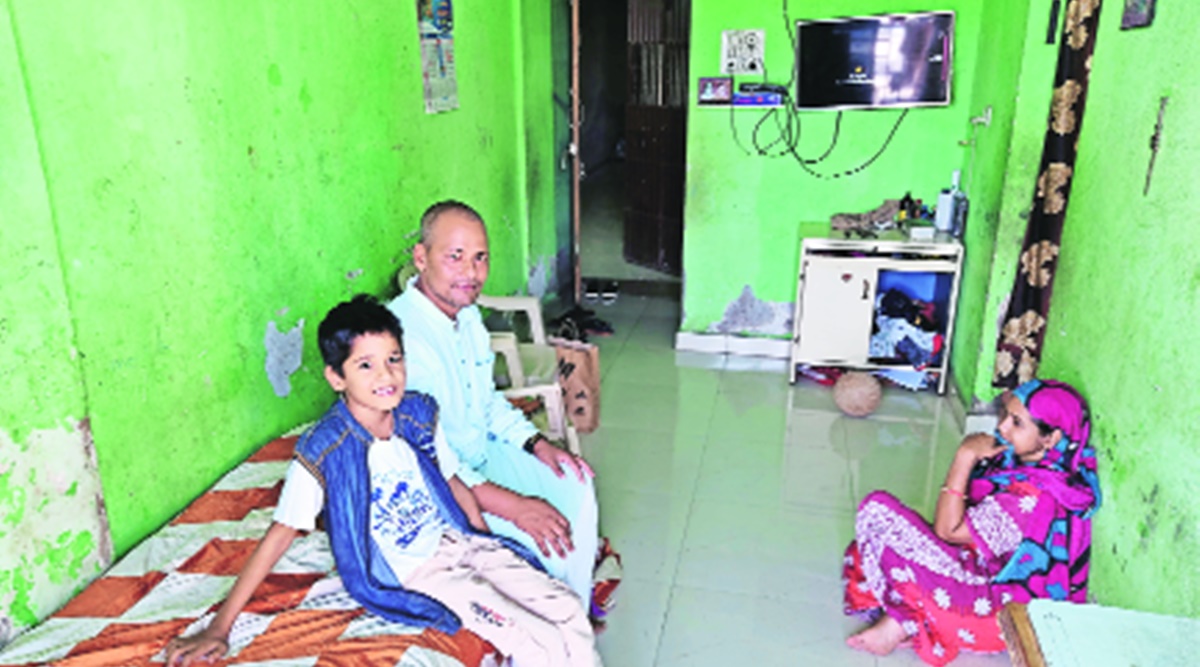 Liaqat Ali with son Moin at his home in Navi Mumbai. Express
Liaqat Ali with son Moin at his home in Navi Mumbai. Express OVER THE last three months, Liaqat Ali had begun to hope that ‘normalcy’ had returned. Ali sells omelettes and bhurji pao outside Churchgate station. His last regular work day was on March 18, 2020, six days before the national lockdown was announced.
Ali went back to his hometown in Uttar Pradesh in May 2020, returned to the city in August and reopened the food stall in December. With a complete lockdown looming again and restrictions already in place, Ali fears a repeat of 2020. Last week, three men working with him left for their home states of UP and Bihar, uncertain of the future after the experience of the sudden lockdown last year.
Before the lockdown, Ali’s daily routine was to travel to Churchgate after 5 pm from his home in Navi Mumbai. He coordinated supplies of eggs, bread, onion, tomatoes, spices and set up his stall by 8 pm, just after the evening peak hour subsided and commuters stopped for a quick bite before taking trains to far-flung northern suburbs. His stall was open till the last local left the station around 12.50 am.
When he shut down the stall during the national lockdown, he thought it would be a matter of days before he got back to his routine. “I did not think it would be so many months,” he says.
After his return last August, Ali rushed to the space near the station where he had stashed his utensils, stove and a foldable table. “It had all been stolen. I had to spend Rs 20,000 to buy everything again,” he says.
Those like Ali who earned over Rs 20,000 per month and had some savings managed to survive the lockdown, but the economic shock of the past year has set them back financially by many years.
Unlike thousands of others, Ali and his wife Ishrat decided to stay put in their one-room home in Koparkhairane rather than risk travelling on foot or trucks. But they left in May when they could not afford to stay in the city. “We left when they started the trains to take migrant workers back to their hometowns. We stayed at Ishrat’s mother’s village, where there is some income due to farming,” he says.
In August, Ali had an accident and was told that surgery would cost over Rs 1 lakh. He returned to the city and got operated at a public hospital, taking a loan by mortgaging jewellery.
After recuperating, Ali returned to Churchgate in the last week of August, but with train services operating only for essential workers and restrictions still in place, restarting the stall was unviable. “I had no option but to sell small items I bought in Crawford Market. I sold earphones, mobile stands, even sanitiser bottles outside the station,” he says.
For Ali, the biggest concern is his son’s studies. Moin, a Class V student in a private English medium school, has not attended online classes for a year as the family was unable to pay the fees, amounting to nearly Rs 1 lakh.
With restrictions eased for the general public to travel on local trains in February, Ali had begun hoping for earnings to pick from March. But that hope crashed with the second wave of Covid infections and new restrictions.
Ali has not decided if he should leave immediately, hoping that the spike is temporary. “I cannot imagine restarting all over again for the second time,” he says.
- The Indian Express website has been rated GREEN for its credibility and trustworthiness by Newsguard, a global service that rates news sources for their journalistic standards.

